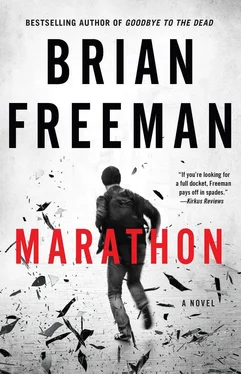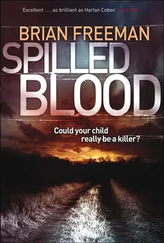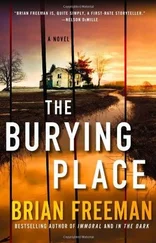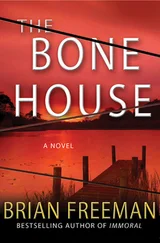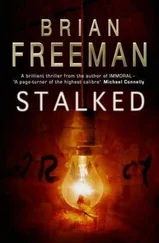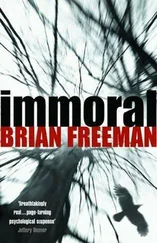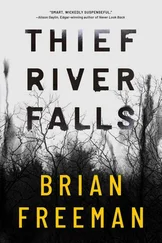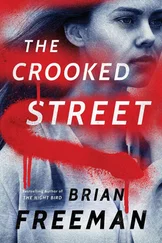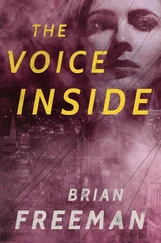“Make sure the schools and the mall are cleared before we take runners inside,” Stride told her. “I don’t want anyone walking into a trap.”
“On it. How bad is the situation there?”
“We’ve got dead and injured on the ground. Trauma teams are on the way.”
“You need me down there?”
“Not yet. Secure the rest of the route.”
“Okay. Have you found Serena and Cat? Are they safe?”
“I’m still looking.”
He grabbed his phone and dialed Serena’s number, but the call failed. He tried again with Cat’s number and got the same result. Bad news traveled instantly on social media; cellular bandwidth was already overloaded in the wake of the explosion. Across the country, thousands of people were dialing friends and family in Minnesota. Across Duluth, nearly everyone was calling everyone else.
Stride pocketed his phone. He stepped out among the dead and dying, most of whom were in a semicircle outside the Duluth Outdoor Company shop. Nails and ball bearings littered the street, along with popcorn fragments of glass. The silver thermal blankets that typically kept runners warm after the marathon now covered the victims. He checked each face, afraid that he would recognize one of them, but he didn’t see his wife or the girl he loved like a daughter among the injured.
Then he saw a man lying on his back on the street, away from the immediate blast zone. A female marathon runner bent over to tend to him. The man’s eyes opened; his limbs moved; he was alive. As Stride watched, the runner who was helping the man stood up and flagged an emergency medical worker for assistance.
When the runner turned toward him, Stride saw her face.
It was Serena.
Wade Ralston opened his eyes. He stared up at a gray sky, and individual raindrops streaked toward his face. The world was absolutely silent. No voices. No wind. No waves on the lake. He opened his dry mouth to speak — “Where am I?” — but he didn’t know if he’d said anything at all. He didn’t hear anything except a hollow rushing sound, as if he were holding a seashell up to his ear.
He blinked and shook his head.
Then, with a roar, noise rushed back. His hearing returned, overwhelming him with its shattering volume. Men and women shouted. Sirens screamed. Footsteps ran. He squirmed, trying to get up, but his brain spun, and he sank back in confusion. Everything was a blank; nothing made sense. He had no memory. He remembered only the coolness of a lake breeze and the deep green of the trees and the sound of his breathing, and then—
Nothing.
“What happened?” he asked aloud.
Wade heard his voice, but it sounded far away.
“Don’t try to move,” someone said.
A woman knelt over him. He tried to get up again, but her hands pressed his shoulders back onto a hard, uncomfortable surface. He stared at her, not understanding. She was a stranger, but she could have been an angel. Her black hair was tied behind her head, emphasizing the angles of her face. She wasn’t young, but she looked ageless. Her warm eyes were as green as emeralds, and her lips were pale. She was statuesque, with tanned, muscular arms and legs. A medal dangled from her neck.
A runner’s medal.
He remembered now: the marathon.
He remembered everything. The miles from Two Harbors. The pain and exhaustion. The finish line, so close. Joni, Travis, Shelly, all cheering for him. Then time stopped.
“Where am I?” he murmured.
The angel spoke. “We’re in Canal Park. Don’t worry, you’ll be okay. We’ll get you to a hospital very soon. Just lie still.”
She stood up. From the ground, Wade saw that she was tall. Her legs were sleek, but on her calves, which were near his face, he saw scars. He watched her gesture to someone, and moments later, a medic knelt at his side. He was dressed in an orange T-shirt, with an orange baseball cap, and he draped a thermal blanket over Wade’s body. The medic studied his eyes.
“Are you in pain, sir?”
“I don’t know,” Wade said. “I’m not feeling anything.”
“How many fingers am I holding up?”
Wade saw two fingers, and he said so.
“That’s good. Try not to move. There’s blood behind your head. You may have banged it when the blast knocked you over. You have shrapnel wounds, too.”
“Blast?”
“Somebody set off a bomb,” the man told him.
Wade said the first thing that came into his brain, along with the image of his wife. “Where’s Joni? Is she okay?”
Stride and Serena crossed the distance between them and embraced on the street. He held her tightly, and relief poured from both of them. He’d already dealt with the death of his first wife, Cindy, nine years earlier, but when the bomb went off, he’d felt a wave of certainty that Serena was dead, too. He’d felt darkness stalking him like a serial killer.
But the darkness hadn’t come for him. Not this time.
“Are you okay?” he asked.
“I’m fine.” Serena knew how to read his mind, and she could guess what he’d been thinking. “Really, Jonny, I wasn’t even there. I was in the runner recovery area when it went off.”
“I was afraid that you—”
“I know. I was worried about you, too.”
He held her again, but they didn’t have time to say anything else. The clock was already ticking on the investigation. Once the victims were transported to St. Mary’s and St. Luke’s, he and his team needed to secure the crime scene for the FBI. Rain was now washing away evidence. As cops liked to say, blood got cold fast.
He knew this would be a federal investigation. Any hint of terrorism moved the case up the food chain and out of the hands of the locals. In another hour, maybe two, Stride and his team would be playing supporting roles. The FBI would be in charge.
“Where’s Cat?” Serena asked. “Did you send her over to Maggie’s place to wait for us?”
Stride stared at Serena. The chill of fear returned to his body. So did the anticipation of loss.
“I thought she was with you. Weren’t the two of you together?”
“No, I never saw her. I told you, I was still in the recovery area after the race. They don’t let anybody but runners in there.”
“Cat came down here to find you,” Stride said. His voice was hollow.
Serena grabbed his arm like a vise. “Oh, my God, Jonny, where is she?”
“What are you doing, Dad?” Evan asked.
Michael Malville opened his eyes. “I’m trying to remember somebody’s face,” he said.
He and Evan stood in front of Sammy’s Pizza, a block from the marathon route. The street was deserted, as if they’d taken refuge in a ghost town. They’d heard the bomb blast from the corner of Lake and Superior and seen the smoke rising out of Canal Park. People had begun to run. He’d dragged Evan away from the danger zone and made an immediate call to Alison to let her know they were safe, but he wasn’t ready to go home yet.
He used his phone to scroll through his Twitter time line. The top trending hashtag was #marathon. Below it, the next hashtag on the list was #noexceptions. He read through the speculation about who was behind the bombing, and he wanted to put out a tweet to say: I saw him.
“Whose face are you trying to remember?” Evan asked.
“That man who bumped into me on the sidewalk,” Michael told his son. “Did you see him?”
“No. Why do you want to remember him?” Then Evan whispered, as if they were part of a conspiracy, “You think he was the bomber, don’t you? You think it was him!”
“I don’t know, Evan. I have no idea who the man was. I just want to be clear in my own mind about what I saw, in case anyone asks me.”
“Why do you think he did it?” Evan asked, as if Michael had already put the man in a police lineup.
Читать дальше
